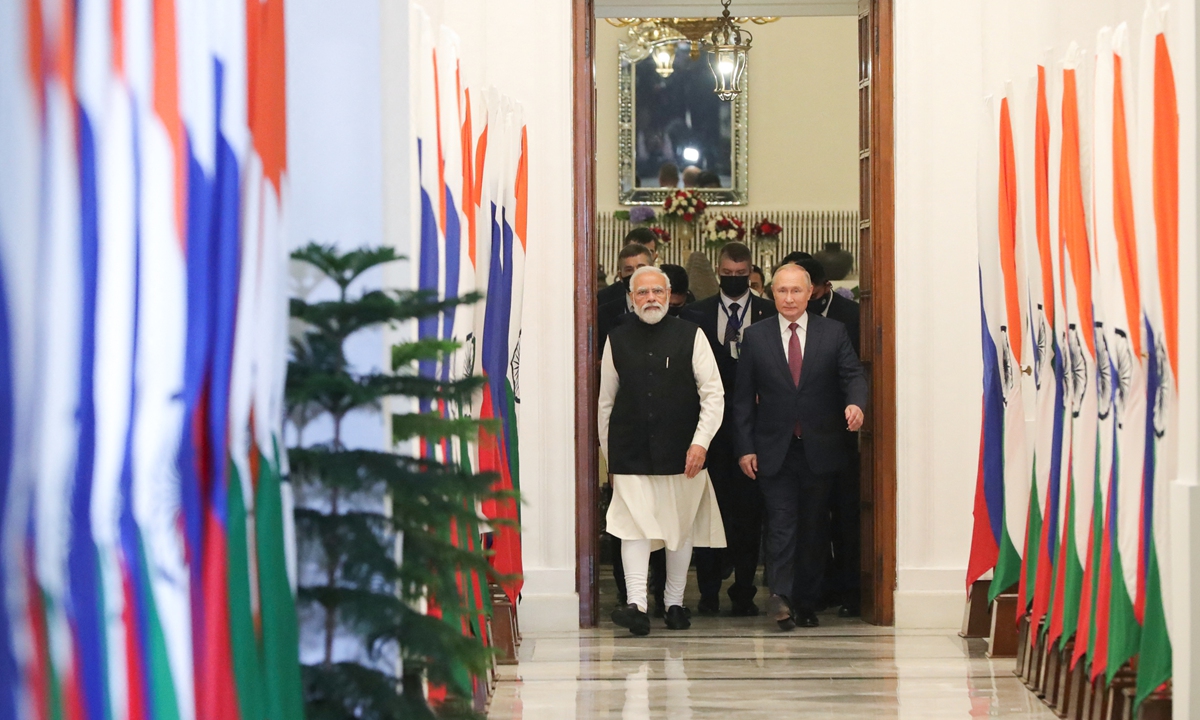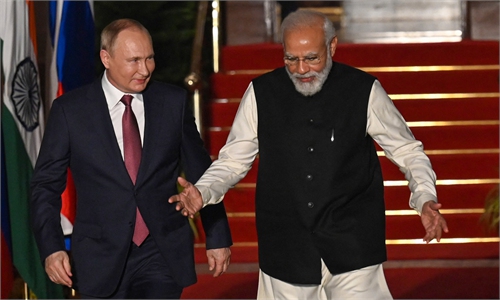
Russian President Vladimir Putin and India's Prime Minister Narendra Modi hold a meeting at Hyderabad House in New Delhi on December 6, 2021. Photo: AFP
Russian President Vladimir Putin visited India on Monday. He held a one-on-one meeting with Indian Prime Minister Narendra Modi before the 21st India-Russia summit. It is reported that the two countries will hold the first 2+2 ministerial dialogue in New Delhi to discuss pivotal bilateral, regional, and international issues. Indian Ministry of External Affairs spokesperson Arindam Bagchi said, "The establishment of this new mechanism of [the] two plus two dialogue is expected to further strengthen the strategic partnership between the two countries."In mid-November, Russia started supplying S-400 air defense systems to India. The deal of purchase was concluded in 2018, since when Washington has spared no effort to hinder the deal and warned of sanctions on New Delhi. But India ignored US warnings and adhered to the deal struck with Russia. This being the case, will the US sanction India? How will it affect US-India relations since the two have been getting closer in recent years?
The main purpose of India's move closer toward the US is to counter China rather than as a cold shoulder to Russia. Due to a growing gap in national strength and military power, India began to see China as its biggest threat and main geopolitical competitor. It fears that China will resort to using force to settle territorial disputes with it. New Delhi is clear that it cannot stand up to China by itself and has therefore turned to Washington for support.
India said it is a like-minded partner of the US-led West. But it didn't follow the West's lead in criticizing Russia over issues related to Crimea and Ukraine. India has a traditional friendship with Russia dating back to the Soviet era. Russia still remains as the main supplier of weapons to India. In addition, given India's balancing act of diplomacy, New Delhi will not distance itself from Moscow for the sake of catering to Washington.
India is aware that what the US demands from it comes at a price. The first purpose of the US is to prevent India's purchase of S-400 air defense missiles from Russia in order to capitalize upon the Indian arms market and seek economic benefit. After the Cold War, India became the world's leading arms importer, with sources expanding from Russia to the US, France, the UK and Israel, among others. However, the US wants to gradually replace Russian-made weapons with US-made alternatives in the Indian weapons systems in order to monopolize the Indian weapons market in the future.
Second, for the purpose of confronting China, the US wants India to completely fall in line and be subservient like Australia, the UK, and Canada. It wants to strategically control India by becoming dominant or even guaranteeing itself as the only supplier of weapons to make New Delhi dependent on Washington.
India's tilting toward the US has sparked concern and discontent from Russia. It is wishful thinking for India to presumably take a free ride on the US in containing China. The quasi-alliance between India and the US is dominated by the latter - India can barely maintain its autonomy in this regard. Thus, Russia can hardly believe that India will stand by it if the US forces India to pick a side. As a counter measure, Russia has strengthened its relations with Pakistan in recent years, not only by supplying arms, but also by conducting joint military exercises, to sound the alarm on India.
Except for the Quad Leaders' Summit, the US-India 2+2 Ministerial Dialogues, and superficial joint military exercises, India has gained very limited benefits from the US. Washington doesn't grant preferential tariff treatment, discounts in arms sales, or any help to India in its pursuit of permanent membership in the UN Security Council. Instead, the US has ignored India's right to development and has made excessive demands on India on climate issues, despite India's impoverished situation. The so-called China threat, the main reason for India to stand with the US, however, remains an illusion of Indian politicians.
China, Russia, and India issued a joint communiqué at the 18th Meeting of the Foreign Ministers on November 26. The communiqué includes 35 points of consensus covering a wide range of global and regional matters. It can be seen that the shared bilateral and trilateral interests among the three countries far exceed those between India and the US. This might be the reason why India is swinging back in terms of diplomacy.
The author is a senior research fellow with the Academy of Regional and Global Governance at the Beijing Foreign Studies University and the president of the Chengdu Institute of World Affairs. opinion@globaltimes.com.cn

